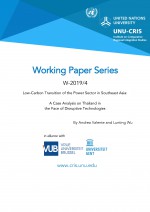External Great Powers as Drivers for Regional Integration and Cooperation: A Comparative Study on Central Asia and Southeast Asia
With their high geopolitical importance and rich natural endowments, both Central Asia and Southeast Asia are inserted in the arena permeable to the influence of external great powers that seek to safeguard their interests and maintain their grip on regional affairs. The lack of incentives for spontaneous integration and the primacy of sovereignty in both regions concedes a greater role for external powers in shaping integration and cooperation conforming to their interests. Drawing upon the theories of neorealism and neoliberalism, this paper attempts to discern how external powers’ interests and practices may promote regional integration and cooperation. Through the neorealist prism, the perception of threats reveals the necessity for external powers to ensure their security and maintain their sphere of influence. The convergence of common security interests between Russia and China in countering not only conventional but also unconventional threats has led to the establishment of security regimes that foment collaboration and even integration in Central Asia, while the long prevalence of traditional threats in Southeast Asia has pushed countries to align with US security strategies that by and large have guaranteed regional security and nurtured ideological proximity. From a neoliberal perspective, the asymmetrical interdependence fostered by external powers in an institutional context, notably by China, by virtue of its strong economic power and through the exercise of economic inducements, has attracted secondary states in both regions into its development orbit and has generally won deference from them to those multilateral institutions in which policy coordination and economic cooperation have been cultivated. In sum, exogenous powers have strategically sponsored integration and promoted cooperation in these two regions.

